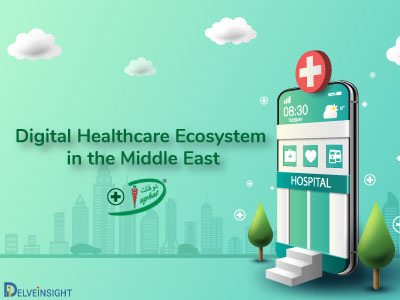DATE
August 18, 2021
CATEGORY
Blog
SHARE

A significant societal problem in the present time is inadequate quality of the health services. The problem persists worldwide, however, in developing or low-income geographies is more prevalent than the developed ones. Thus, worldwide rampant measures are underway by several governments to facilitate best-class healthcare services to its citizens. However, the path is arduous and calls for the participation and cooperation of a wide variety of experts from different fields. To achieve this, there is a dire need of a catalyst that can amalgamate healthcare with technology to produce best-in-class healthcare services. Many innovations and advancements are occurring on a regular basis globally.
In similar lines, the Middle East, a burgeoning region in itself, is trying to adopt digital changes in healthcare sector. Increasing prevalence of non-communicable diseases including diabetes, sedentary life-styles, unhealthy food habits are some of the challenges the Middle East region is facing nowadays. However, the region plans to combat these with the help of Digital healthcare services. For instance, monitoring disease trends, recording compliance to chronic patients to treatment regimens, and tracking the improvements in recovery have become viable with the help of digitized healthcare in the times of COVID. Thus, despite budget constraints resulting from low global oil prices, the Middle East countries are eagerly developing world-class healthcare systems and have unveiled ambitious plans to do so. Countries like the UAE, Qatar & Saudi Arabia have already embarked on their journey and are some of the leading countries to fulfill their plans and visions to build high tech medical cities.
Some of the trends poised to reform the existing healthcare landscape in the MENA region are as follows:
- Artificial Intelligence (AI) has an important role to play in future health care offerings. It is the primary requirement behind the progress of precision medicine, generally acknowledged to be an innovation in treatment that is desperately required. It also plays an important role in imaging, diagnosis, & clinical decision support. Significant gains are expected in the productivity after the implementation of AI in healthcare. In Middle East region, the UAE & Saudi Arabia have started to make initiatives in this field. Regional healthcare startup like Okadoc have generated USD10M funding, one of the highest in the Middle East and North Africa region (MENA), which they plan to use to launch telemedicine, enabling medical practitioners to offer virtual consultations.
- The healthcare services industry will emerge as a high-growth option in the region as GCC countries seek economic diversification. The UAE launched its first AI strategy in 2017 with aim to reduce the burden of non-communicable diseases and other dangerous diseases. The country is aspiring to become the global hub for AI and has developed a technology-focused ministry to oversee all the developments and initiatives. As per the smart home care project launched by the Dubai Health Authority (DHA), the government wants to facilitate that the patients can be monitored safely and easily without the need to visit the health facility during treatment or procedure & AI will be useful in evaluating the information, acquiring greater insights.
- Remote diagnostics and patient consultation have become new innovation trends in digital health ecosystem. Application of AI, Big Data, Internet of medical things (IoMT), blockchain, as well as Augmented reality (AR) and Virtual reality (VR), 3D diagnostics to create and store patient records and other healthcare information. Precision diagnostics has thus become more crucial than ever in the era of rising medical costs as it provides patients with personalized care, particularly chronic treatment. This effectively increases the level of treatment that can often be accessed by a patient, resulting in enhanced health outcomes and increased quality of life. Most health technology firms in the diagnostic field have recently concentrated on radiology solutions, with innovators developing different algorithms that use deep learning to interpret medical photos, accurately diagnosing diseases such as breast cancer, tuberculosis etc. Also instant transfer of medical imaging via digital health has helped in faster diagnosis as the waiting period has significantly reduced.
- Use of smart watches & AI enabled devices have become quite popular in Middle East region. Biosensors embedded in these devices continuously track the progress of a patient while creating knowledge database through Big Data that can be analyzed in several ways, leading to improved insights into community health and better management of patients. With the help of these wearables, massive benefits can be leveraged by curbing the growth of the disease.
- The Spanish-based MedLab Media Group (MMG) which developed the MedsBla application works with both Saudi Arabia’s private and public sectors to build various customized AI solutions using natural language processing. The MedsBla framework is an encrypted communication tool for medical professionals using AI to help their decision-making.
Over the past few years, digital health innovations have gained traction and history shows that rapid growth in the implementation of technologies such as AI, Big Data, blockchain and IoMT will be seen in the coming next decade, influencing the lives of people. AI has emerged to be the key technology, which can be used in various fields. When combined with other technologies like 3D system, block chain, Augmented Reality, Virtual Reality, the results are expected to be highly positive and beneficial.
Beyond the shadow of doubt, the MENA region offers lucrative opportunities to pharma and biotech players to increase their foothold in the MENA region. The proactive approach to adapt to new changes and transform their healthcare depicts the strong stance of the MENA governments in the favor of Digitization of healthcare services. Keeping in view the amount of time and money invested by the Middle East countries to develop digital health, it will not be wrong to say that in coming few years, the MENA region will be giving a tough competition to western countries in setting digital healthcare ecosystem.
Source: DelveInsight – www.delveinsight.com






